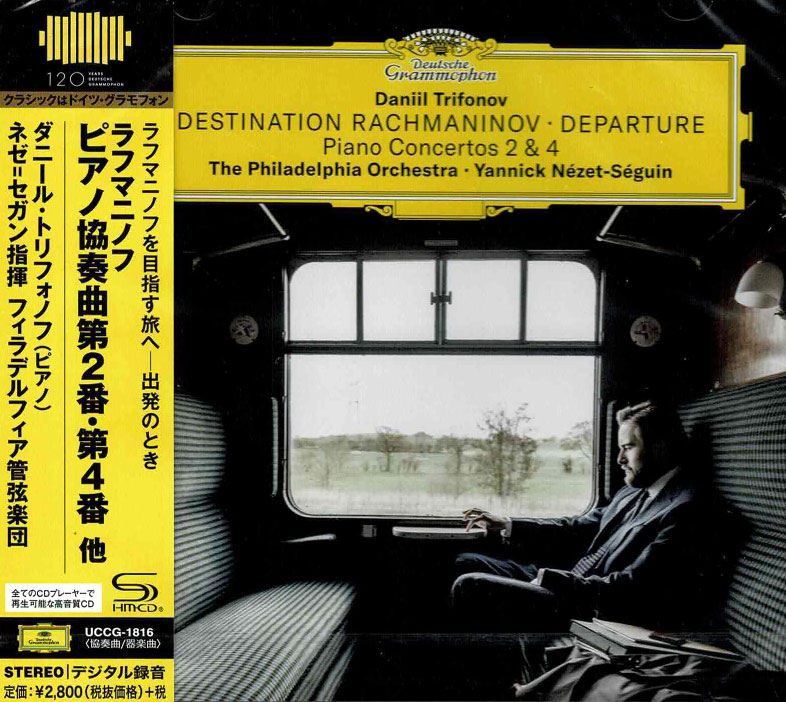Logowanie
Dziś nikt już tak genialnie nie jazzuje!
Bobby Hutcherson, Joe Sample
San Francisco
SHM-CD/SACD - NOWY FORMAT - DŻWIĘK TAK CZYSTY, JAK Z CZASU WIELKIEGO WYBUCHU!
Wayne Shorter, Freddie Hubbard, Herbie Hancock, Ron Carter, Elvin Jones
Speak no evil
UHQCD - dotknij Oryginału - MQA (Master Quality Authenticated)
Chesky! Niezmiennie perfekcyjny
Winylowy niezbędnik
ClearAudio
Double Matrix Professional - Sonic
najbardziej inteligentna i skuteczna pralka do płyt winylowych wszelkiego typu - całkowicie automatyczna
RACHMANINOV, Daniil Trifonov, Yannick Nezet-Seguin, Philadelphia Orchestra
Destination Rachamninov - Departure - Piano Concertos 2 & 4
Destination Rachmaninov: Departure
Piano Concerto no. 2 -
01. I. Moderato - Più Vivo - Maestoso (Alla Marcia) - Moderato (11:14)
02. II. Adagio Sostenuto (11:47)
03. III. Allegro Scherzando - Moderato - Allegro Scherzando - Presto - Moderato - Allegro Scherzando - Ala Breve. Agitato - Presto - Maestoso - Risoluto (12:16)
Suite from J. S. Bach's Partita for Violin, BWV 1006, piano transcription -
04. I. Preludio. Non Allegro (3:48)
05. II. Gavotte (2:45)
06. III. Gigue (1:42)
Piano Concerto no. 4 -
07. I. Allegro Vivace (10:06)
08. II. Largo (7:05)
09. III. Allegro Vivace (9:24)
- Daniil Trifonov - piano
- Yannick Nezet-Seguin - conductor
- Philadelphia Orchestra - orchestra
- RACHMANINOV

Trifonov is wonderfully alive to [the Fourth’s] mercurial piano writing, achieving astonishing crystalline delicacy in the elaborate filigree passage work and negotiating unexpected juxtapositions of mood…Nézet-Séguin and the superbly responsive Philadelphia Orchestra follow the soloist’s every interpretative nuance.
Trifonov is wonderfully alive to [the Fourth’s] mercurial piano writing, achieving astonishing crystalline delicacy in the elaborate filigree passage work and negotiating unexpected juxtapositions of mood…Nézet-Séguin and the superbly responsive Philadelphia Orchestra follow the soloist’s every interpretative nuance.
 November 2018
November 2018
Trifonov is a gifted pianist, the Philadelphians have the music in their blood and Nézet-Séguin has an eye for detail and careful phrasing…Overall, this is another fine, well-recorded addition to the lengthy discography but one which neither astonished nor moved me.
 12th October 2018
12th October 2018
What can one say about what must be one of the more frequently performed works in the concerto repertoire? Well, if you’re Daniil Trifonov then the answer is “quite a lot”...both Trifonov and Nézet-Séguin seem pleasingly keen to avoid any hint of wallowing self-indulgence, and what comes across is the amount of detail there is, not just in the piano part but also in the orchestral writing.
 21st October 2018
21st October 2018
From the huge sonority of the C minor concerto’s opening chords, the pianist shows that he means business, but it is the astounding delicacy of his virtuosity in the piu vivo section — recalling Horowitz — that marks him out as a soloist of the first rank in this work. He is no less commanding in the more “jazzy, mechanical” (Trifonov’s words) G minor concerto.
 25th October 2018
25th October 2018
These are performances of such musical awareness, tonal variety and dazzling virtuosity that even the Second, one of the most popular of all piano concertos, has every trace of routine and over-familiarity stripped away. Trifonov has the gift of making something compelling out of the least attention-seeking piano lines...the woodwind playing is superb, but it’s the simple eloquence of Trifonov’s playing that constantly draws the ear.


































